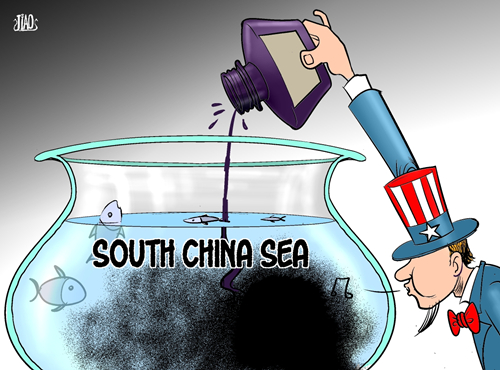Three ideas to make a breakthrough on South China Sea issue
- By Hua Yiwen
 0 Comment(s)
0 Comment(s) Print
Print E-mail People's Daily, October 18, 2013
E-mail People's Daily, October 18, 2013
Over a period of 14 days, Chinese President Xi Jinping and Premier Li Keqiang have visited five Southeast Asian nations, and attended the APEC economic leaders' meeting and a series of East Asia summits, during which the two Chinese leaders expressed China's opinion on China-ASEAN ties and the South China Sea issue as well as raising new cooperation proposals. They conveyed positive messages on actively and steadily handling the issue, reflecting a will to make a breakthrough on the issue through innovative thinking.
|
|
|
Fish in troubled waters [By Jiao Haiyang/China.org.cn] |
In short, China put forward three "breakthrough" ideas to handle maritime disputes in a peaceful manner: controlling divergence, exploring joint development, and promoting maritime cooperation. The path to peaceful settlement of disputes lies in full and effective implementation of the Declaration on the Conduct of Parties in the South China Sea (DOC). A code of Conduct in the South China Sea (COC) will be the continuation of the DOC. This should not be set up as a barrier for China. It should be a guideline for parties concerned to seek the greatest consensus, manage divergences constructively, and avoid unilateral action leading to an escalation or an internationalization of the South China Sea issue.
Exploring common development is practical. Eight years ago China, the Philippines and Vietnam signed the Joint Marine Seismic Undertaking (JMSU) which created a precedent for joint development in the South China Sea; in 2011, China and Vietnam made it very clear in a statement that both sides would actively research and negotiate the joint development of the sea. During Chinese Premier Li's visit to Vietnam from Oct. 13 to Oct.15, China and Vietnam announced the two sides would formally establish a bilateral workforce for maritime exploration and consultation, strive to achieve substantive progress in the joint development in the waters outside the mouth of the Beibu Gulf before the end of 2013, and also discuss further development in a wider range of waters.
Maritime cooperation is not limited to the claimants in the South China Sea. China is willing to strengthening maritime cooperation with the ASEAN countries, make better use of the China-ASEAN cooperation fund and work together to build a 21st century maritime Silk Road. China and ASEAN have great potential in maritime cooperation, covering the maritime economy, marine interoperability, maritime environmental protection and research, and more.
China's three breakthrough ideas are consistent with the country's diplomatic strategy: pursuit of peaceful development, cooperation, and a new win-win diplomatic philosophy. China stands firm on its sovereignty, but at the same time upholds the principle of a pragmatic, flexible and well-intentioned attitude. It supports a settlement on the South China Sea disputes achieved both through consultations and negotiation between the concerned parties, and through multilateral channels.
The three ideas meet the common interests of China and ASEAN.
During the Chinese leaders' trip to Southeast Asia, the two sides defined the broad prospects of the development of China-ASEAN ties, and a clear roadmap of the means by which they are to be achieved. Joint development and maritime cooperation are not only significant to economic interests, but also they have a wider political and strategic significance to regional peace and stability.
Only if the parties involved, along with China, follow adopt these three ideas and deal with the South China Sea issue actively and constructively, can the sea be "a sea of peace, friendship and cooperation".
The author is Hua Yiwen, expert on global issues.







Go to Forum >>0 Comment(s)